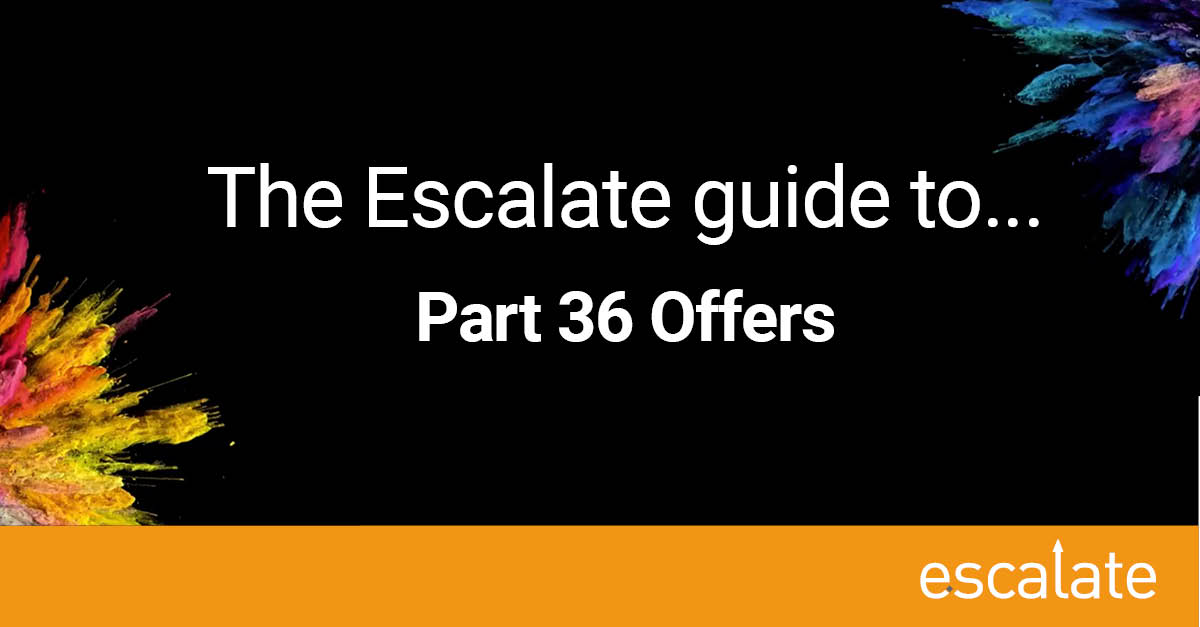Part 36 offers are a commonly used tactic employed during the dispute resolution process, and when used strategically can often bring a swift conclusion to a case, thus avoiding court altogether. This article explains exactly how they work, and the terms and conditions attached to them.
In this article:
- What is a Part 36 offer, and when can it be made?
- What are the terms of a Part 36 Offer?
- Why use a Part 36 offer?
- How can a Part 36 offer to settle be made?
- What happens if the opponent doesn’t accept?
- If you’re the claimant…
- If you’re the Defendant…
- What happens after acceptance?
- Can a Part 36 offer be modified or withdrawn?
- When can a Part 36 offer not be used?
- Summary
What is a Part 36 offer and when can it be made?
Part 36 of the civil procedure rules are designed to encourage both sides to settle a case before it reaches trial or risk the financial consequences of spiralling legal costs.
They’re a strategic move used during negotiations to avoid the time and hassle associated with court proceedings, and can be made by either a claimant or a defendant at any stage during a dispute. Part 36 offers can also be made in appeal proceedings, or before the commencement of court proceedings.
Part 36 offers can be made in respect of both money (including claims for provisional damages) and non-money claims, and can relate to the whole or part of the claim, or in relation to an issue that arises.
What are the terms of a Part 36 Offer?
They must fully comply with the conditions set out in Part 36 of the CPR, hence its name.
Part 36 offers must be genuine offers to settle, and be made ‘without prejudice except as to costs’. This essentially means that the amount and terms of the offer are not disclosed to the trial judge, who will only be made aware of the offer once the matter has concluded. They cannot be used as evidence of an admission during the course of the trial.
Once a case has been decided, the offer can be used to assist with determining how much the unsuccessful party should be ordered to pay towards the winning party’s costs. Part 36 offers can also cover liability alone, leaving the issue of the amount of any damages to be dealt with later, as well as counterclaims and any additional/third party claims.
There is nothing to prevent a party to a dispute making an offer to settle it in any way it chooses. There can be costs, interest and tactical advantages in making a formal offer to settle which complies with the rules of court. In fact, the Civil Procedure Rules (CPR) state that the court must take into account any offer to settle that is made during proceedings.
Why use a Part 36 offer?
The most common reason for using Part 36 offers is to help avoid the time and extra incurred costs involved with concluding a case via court proceedings.
When used strategically as part of the dispute resolution process, they often focus an opponent’s mind and put pressure on them to settle. This is one of the reasons why Escalate uses Part 36 offers frequently during negotiations.
Their tactical use increases the opponent’s risk in proceeding with litigation, and may facilitate reaching a commercial settlement later in the process.
How can a Part 36 offer to settle be made?
Once your case is engaged with us, the Escalate team can draft and make a Part 36 offer to settle on your behalf, and will always advise you on the best course of action according to your individual circumstances.
The basic rules as a claimant making a Part 36 offer to settle are as follows:
- The Part 36 offer must be in writing.
- State on its face that it is intended to have the consequences of Part 36.
- Specify a period of not less than 21 days within which the defendant will be liable for the claimant’s costs if the offer is accepted (‘the relevant period’).
- State whether it relates to the whole of the claim or to part of it or to an issue that arises in it, and if so to which part or issue.
- State whether it takes into account any counterclaim.
- Contain sufficient information to allow the offeree to consider the offer which will be necessary where the offer relates to a non-money claim.
What happens if the opponent doesn’t accept?
The opponent is at risk with regard to paying extra costs and interest if they are subsequently awarded a lesser sum, following the conclusion of Court proceedings. In this case, the Court would order the opponent to pay your costs, from the date when the relevant period of the offer expired, plus interest.
If the opponent rejects the Part 36 offer, but later obtains a judgement at the end of the trial awarding them a higher sum than the sum originally offered in the Part 36 offer, the Court will order you to pay their costs plus interest on an indemnity basis.
Here are two possible scenarios of what can happen if a Part 36 offer is not accepted by the other side:
If you’re the claimant…
If you’re awarded a judgment which is equal to or more advantageous that your Part 36 offer, the Defendant will have to pay you the judgement sum, and you should also be awarded:
- Interest on the whole or part of the sum awarded up to 10% above base rate, from the expiry of the Relevant Period.
- Your legal costs up to the end of the Relevant Period on a standard basis, then after the Relevant Period on an indemnity basis.
- An uplift of up to 10% on the amount awarded up to £500,000. Anything over that figure will be an uplift of 5%, capped at a maximum of £75,000.
- Interest on all costs at a rate of up to 10% above base rate.
If you’re the defendant…
If the claimant successfully obtains judgment but fails to obtain a costs award that is higher than the defendant’s Part 36 offer:
- The defendant will need to pay the judgment sum
- The claimant will be awarded its costs up to 21 days after the offer was made (the end of the relevant period). However, they will be liable for the Defendant’s costs from the end of the relevant period, plus interest.
Although they have ‘won’ at trial, the claimant will essentially be penalised for pursuing their day in court, when they should have accepted what was a reasonable offer.
On the other hand, if the claimant is successful in winning a judgment that is ‘more advantageous’ than the Part 36 offer, then the offer is of no effect.
As demonstrated, Part 36 offers can work strongly in the Defendant’s favour if the claimant doesn’t manage to win a settlement that is higher than the original offer.
What happens after acceptance?
Acceptance must be in writing, and a copy of acceptance should also be filed with the court.
There are strict rules around when and how payment must be made following acceptance. The entire settlement offer must then be paid within 14 days — it’s not possible to pay in instalments.
Once a Part 36 offer is accepted, proceedings against the other party will be suspended, as long as the terms of the offer are adhered to.
Can a Part 36 offer be modified or withdrawn?
Yes, it can, but there are conditions attached to it.
During the “relevant period” a Part 36 offer can be modified or withdrawn with permission from the court. However, unless there has been a drastic change of circumstances that makes withdrawal necessary, the court may not grant permission.
Any modifications to the offer, or intention to withdraw needs to be made in writing and served to the other side or their legal representative.
Outside of the relevant period, the terms can be changed to be less advantageous to the other party, which can be done without the court’s permission as long as a notice of acceptance hasn’t already been served.
When can a Part 36 offer not be used?
There are some circumstances where a Part 36 is unable to be used, or where another form of settlement is more appropriate. These include:
- When there are multiple defendants involved and not all of them want to settle, usually in more complex proceedings.
- If non-parties need to included in the settlement agreement in order to avoid future claims.
- Flexibility is needed with payments: If a Defendant is not in a position to pay the entire lump sum within 14 days, a Calderbank offer is the alternate option and preferable choice.
- When a defendant only wants to pay a proportion of the claimant’s costs, and not be liable for full costs up to the date of accepting a Part 36 offer. This is otherwise known as a “drop hands” settlement, which is when both parties agree to bear their own costs and walk away from the dispute.
- When a defendant would prefer to make a ‘costs inclusive’ offer, and wants to know in advance how much they will pay. Part 36 offers cannot be made inclusive of costs.
- If a claim is spurious or overstated but the claimant’s costs are disproportionately high. The defendant is unlikely to accept or make a Part 36 offer due to the costs consequences that would kick in.
- Part 36 cannot be used if the terms of the settlement are purely commercial, such as future business opportunities.
In summary
Escalate has successfully used Part 36 offers to resolve numerous wide-ranging disputes, and recover money owed to our clients. To find out more, download the Escalate Guide to Part 36 Offers or view the other ‘Escalate Guides to dispute resolution’ here.
If you’d like to get in touch with one of the Escalate team to discuss a commercial dispute, please contact us on 0207 039 1950 or email us.
< News & Views
CONTACT US
Contact Us to find out more about how Escalate can help your business.
Exchange Station, Tithebarn Street, Liverpool,
L2 2QP (Registered office)
London office: 5th floor, 15 Westferry Circus, London, E14 4HD
Escalate Law Limited
Company No: 10381993
Authorised and regulated by the Solicitors Regulation Authority
Escalate Law Limited (No: 650666)

